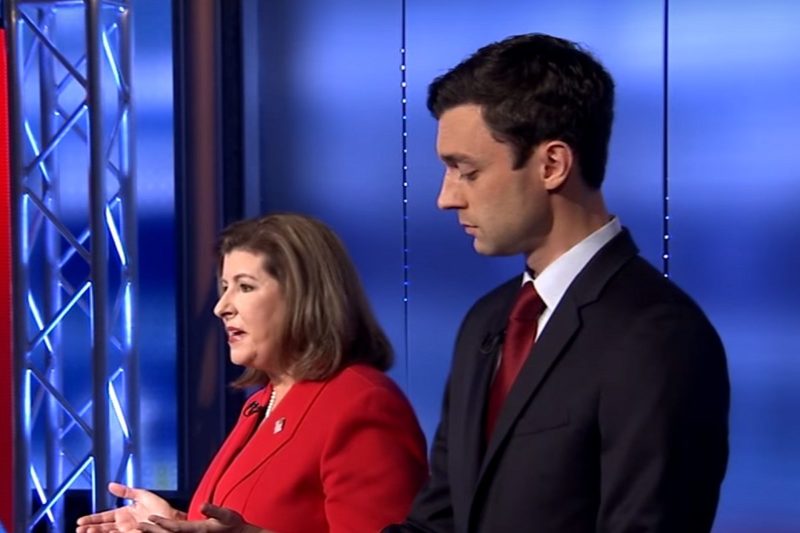Candidates in Georgia Special Election Square Off in Second Debate
Democrat Jon Ossoff and Republican Karen Handel on Thursday sparred in a debate on Trump, Planned Parenthood, and whose experience makes them more fit to represent Georgia's Sixth Congressional District.

The second of two planned debates in Georgia’s special election is now over. Democrat Jon Ossoff and Republican Karen Handel on Thursday squared off in a debate hosted by the local NPR affiliate, WABE, in the race for the state’s open seat in the U.S. House of Representatives.
More than anything, the debate highlighted the messaging strategies adopted by each candidate’s campaign. Record-setting sums have poured into the district; Ossoff’s campaign alone has added $15 million in the last two months, already reportedly pushing the race total over $40 million though the election is still weeks away.
Part of what this money could buy is voter data that helps shape the issues and messages most resonant with voters in Georgia’s Sixth Congressional District. And this seemingly showed in the talking points each candidate circled back to again and again.
As the Atlanta Journal-Constitution noted in a preview of the debate, Ossoff is seeking to rally progressives while simultaneously appealing to moderates and independents, while Handel must walk a fine line around divisions among conservatives created by President Trump’s election.
Handel attempted to paint herself during the debate as a candidate with experience and a record to back up her policy positions, suggesting that Ossoff “talks about what he is going to do, and it may all sound good, but I have actually done it.”
She did not make critical or directly supportive statements of the Trump administration despite having campaigned with the president in late April. When asked about the possibility of impeaching Trump should any of the federal panels investigating Russia’s alleged election tampering conclude that he obstructed justice she deflected, saying, “The responsible thing to do here is let the four investigations proceed …. It is imperative that we get to the facts of the situation and let the facts really drive where we go and what action we take.”
Handel tied Ossoff to House Minority Leader Nancy Pelosi (D-CA), claiming Ossoff’s “values are 3,000 miles away in California,” seemingly a reference to both Pelosi and the support Ossoff has received from out-of-state progressives—topics Handel’s allies have used in ads attacking her opponent.
Ossoff talked about providing “independent-minded leadership” and the need for “bipartisan efforts,” while knocking Handel.
He pointed to Handel’s time at the Susan G. Komen Foundation, which she left amid controversy when she initiated a policy to end Komen’s contributions to Planned Parenthood for breast cancer screenings.
Handel never directly addressed the anti-choice beliefs that have garnered her the support of groups like the Susan B. Anthony List. However, she did manage to target Ossoff in her answer.
“I realize you might not know this because you don’t live in the sixth district,” Handel said to Ossoff, referencing the fact that he lives outside of the district he hopes to represent in Congress. “The sixth district does not have a single Planned Parenthood clinic, we do, however, have four community health centers.”
Ossoff told CNN in April that he had moved from the district while his fiance attended medical school, but that he grew up there and planned to return when those studies concluded.
“And these community health centers are the front door for a full range of health care for low-income women in our community,” continued Handel. She offered no evidence for this assertion, one used frequently by anti-choice politicians and groups even though studies have shown such centers are not able to meet the demands of a full range of reproductive health services.
Ossoff countered by, among other things, pointing out that there is a Planned Parenthood clinic nearby that serves the district’s residents.
Both candidates avoided some questions, instead reverting to their favorite talking points.
For Ossoff this meant suggesting that single-payer health care—a model proposed by some Democrats to make health care a public good paid for by the federal government—is unworkable.
“I think we need a lot less ideology around health care, and a lot more of a focus on how we can make progress on a bipartisan basis. I don’t think a plan like that has any hope of passing this Congress,” Ossoff said.
Handel, on the other hand, would not respond to repeated questions from both the moderator and Ossoff as to whether she agrees human activities are at least partially responsible for climate change.
The most direct answer she gave was this: “Clearly there have been changes in the climate. I am not a scientist, so I read all of that and take it all in,” before pivoting to criticize the Paris Climate Accord as “a fluffy agreement that had absolutely no ability to hold any other nations accountable.”
There are currently no other scheduled debates between the two candidates, however with the latest influx of money, expect both Ossoff and Handel to continue to refine their messaging strategies as the June 20th run-off election draws near.
